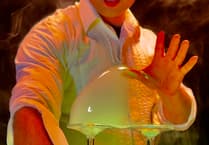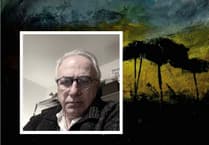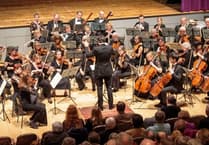As Llangwm village returns to normal after a vibrant literary festival, we look back at one of its highlights.
It has already been observed that Llangwmlitfest ‘punches well above its weight’, and the presence of the National Poet of Wales only serves to confirm the statement.
And what a presence it was! Softly spoken and unassuming, Hanan Issa nevertheless revealed incredible inner strength as she talked about her role in the context of politics, expectations, languages and family. On stage with her was Penny Reuben, who helped to keep the conversation lively with some pertinent questions.
The poet was adamant that poetry should be for everyone. She mentioned her grandfather’s fondness for reciting - not highbrow works of literature though, but working class rhymes, and some of them quite bawdy.
While designed to be appreciated by all, Issa’s poems do contain some untranslated words of Arabic and Welsh, reflecting her own multi-lingual background. She is critical of the English mono-lingual tendency to be offended by any words that cannot be instantly understood, arguing that poetry communicates partly through sound; that it is not hard to look up the meaning of anything these days and that “curiosity is underrated.”
Hanan Issa told a rapt audience that as she was interviewing black and Asian men for a project designed to celebrate their sensitive side - as opposed to traditional 'macho' qualities - she had not expected them all to cry. Yet as she recited one of her poems near the start, it was clear that she has the power to move you with just a few well-chosen words.
Prompted by Penny, Hanan discussed the challenge of being presented with a commission - being told what to write about - and yet still remaining authentic. The tension was apparent in her work to celebrate 75 years of the NHS. She wanted to pay tribute to the men and women who provide such a valuable service whilst avoiding over-praising a system in crisis. Picking up a theme started during Covid lockdowns, her poem ‘The Unsung’ starts with the provocative statement “I will not clap for you,“ and can be heard on the video below. We apologise though for the camera shake and poor sound on the following clip.
“You can be political with a small p,“ the Welsh-Iraqi poet was told when she achieved the title of National Poet of Wales. That occasionally means having to turn commissions down.
She talked about the process of writing: how she likes to let a “bay leaf” of an idea “marinate” for a long while before starting to put pen to paper; and how sometimes something that starts as a poem ends up in another form.
At the end of the session, questions were invited from the audience. One of them related to poetic metre - does Issa always write blank verse or does she follow certain forms with rhyming schemes and set numbers of feet per line? The poet answered that she takes inspiration from the Welsh poetry form Cynghanedd [harmony], which uses internal rhymes and alliteration. Ultimately, the poem needs to say what it means, regardless of form.
Mention was also made of titles, with the poet admitting that titles need a lot of thought, and if she were to receive a commission that also dictated what the title should be, it would probably be reason enough to turn it down!
Another member of the audience said how much better poetry is communicated when you are hearing the poet reciting, instead of looking at the printed page. Hanan joked that the giver of the question must be psychic, as this is the thought behind a forthcoming project. She did say, however, that she derives much pleasure from reading poetry off the page.
With fascinating, enchanting guests like Hanan Issa, little wonder then that Llangwm was buzzing with traffic and visitors this past weekend. The Pembrokeshire village should be very proud of its literary festival.



